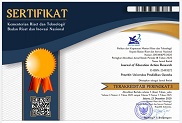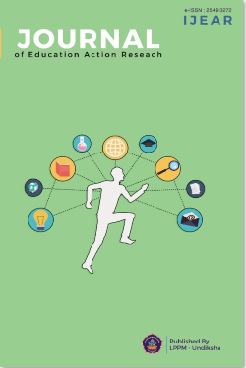The Power of Precision: Why Your Research Focus Should be SMART?
DOI:
https://doi.org/10.23887/jear.v7i4.69757Keywords:
Research Focus, SMART, Doing ResearchAbstract
Having a SMART research focus is essential for researchers to achieve the desired results. By being specific, measurable, achievable, relevant, and time-bound, researchers can improve the effectiveness and efficiency of their research. This study aims to explore the importance of having a SMART (Specific, Measurable, Achievable, Relevant, and Time-bound) research focus. This study used a descriptive-analytical approach by collecting data through literature review and analysis of existing research. The collected data is analyzed qualitatively by reading, understanding, and synthesizing relevant information. The results of this study show that a SMART research focus can increase research productivity, improve decision-making processes, and increase the chances of obtaining meaningful results. In conclusion, by adopting the SMART framework researchers can maximize the effectiveness and efficiency of research results significantly. Thus, this study provides a better understanding of the importance of having a SMART research focus and has implications for more effective and efficient research in the future.
References
Aeon, B., & Aguinis, H. (2017). It’s about time: New perspectives and insights on time management. Academy of Management Perspectives, 31(4), 309–330. https://doi.org/10.5465/amp.2016.0166. DOI: https://doi.org/10.5465/amp.2016.0166
Aghera, A., Emery, M., Bounds, R., Bush, C., Stansfield, R. B., Gillett, B., & Santen, S. A. (2018). A randomized trial of SMART goal enhanced debriefing after simulation to promote educational actions. Western Journal of Emergency Medicine, 19(1), 112. https://doi.org/10.5811/westjem.2017.11.36524. DOI: https://doi.org/10.5811/westjem.2017.11.36524
Berg, K., Askim, T., Balandin, S., Armstrong, E., & Rise, M. B. (2017). Experiences of participation in goal setting for people with stroke-induced aphasia in Norway. A qualitative study. Disability and Rehabilitation, 39(11), 1122–1130. https://doi.org/10.1080/09638288.2016.1185167. DOI: https://doi.org/10.1080/09638288.2016.1185167
Bjerke, M. B., & Renger, R. (2017). Being smart about writing SMART objectives. Evaluation and Program Planning, 61, 125–127. https://doi.org/10.1016/j.evalprogplan.2016.12.009. DOI: https://doi.org/10.1016/j.evalprogplan.2016.12.009
Burgess, E., Hassmén, P., Welvaert, M., & Pumpa, K. L. (2017). Behavioural treatment strategies improve adherence to lifestyle intervention programmes in adults with obesity: a systematic review and meta-analysis. Clinical Obesity, 7(2), 105–114. https://doi.org/10.1111/cob.12180. DOI: https://doi.org/10.1111/cob.12180
Chase, J. A. D., Topp, R., Smith, C. E., Cohen, M. Z., Fahrenwald, N., Zerwic, J. J., & Conn, V. S. (2013). Time management strategies for research productivity. Western Journal of Nursing Research, 35(2), 155–176. https://doi.org/10.1177/0193945912451163. DOI: https://doi.org/10.1177/0193945912451163
Cooke, S. J., Rytwinski, T., Taylor, J. J., Nyboer, E. A., Nguyen, V. M., Bennett, J. R., & Smol, J. P. (2020). On “success” in applied environmental research—What is it, how can it be achieved, and how does one know when it has been achieved? Environmental Reviews, 28(4), 357–372. https://doi.org/10.1139/er-2020-0045. DOI: https://doi.org/10.1139/er-2020-0045
DeMink-Carthew, J., Olofson, M. W., LeGeros, L., Netcoh, S., & Hennessey, S. (2017). An analysis of approaches to goal setting in middle grades personalized learning environments. RMLE Online, 40(10), 1–11. https://doi.org/10.1080/19404476.2017.1392689. DOI: https://doi.org/10.1080/19404476.2017.1392689
Diehm, E. (2017). Writing measurable and academically relevant IEP goals with 80% accuracy over three consecutive trials. Perspectives of the ASHA Special Interest Groups, 2(16), 34–44. https://doi.org/10.1044/persp2.SIG16.34. DOI: https://doi.org/10.1044/persp2.SIG16.34
Dotson, R. (2016). Goal Setting to Increase Student Academic Performance. Journal of School Administration Research and Development, 1(1), 45–46. https://doi.org/10.32674/jsard.v1i1.1908. DOI: https://doi.org/10.32674/jsard.v1i1.1908
Farquharson, K., Tambyraja, S. R., Justice, L. M., & Redle, E. E. (2014). IEP goals for school-age children with speech sound disorders. Journal of Communication Disorders, 52, 184–195. https://doi.org/10.1016/j.jcomdis.2014.09.005. DOI: https://doi.org/10.1016/j.jcomdis.2014.09.005
Glushchenko, V. V. (2023). Ergodesign and “Specific”," Measurable"," Achievable"," Relevant", and" Time-Bound"(SMART) Technologies as Tools for The Formation of Innovative Leadership Programs. ASEAN Journal of Economic and Economic Education, 2(1), 23–34. https://ejournal.bumipublikasinusantara.id/index.php/ajeee/article/view/162/158.
Hall, W., Williams, I., Smith, N., Gold, M., Coast, J., Kapiriri, L., & Mitton, C. (2018). Past, present and future challenges in health care priority setting: findings from an international expert survey. Journal of Health Organization and Management, 32(3), 444–462. https://doi.org/10.1108/JHOM-01-2018-0005. DOI: https://doi.org/10.1108/JHOM-01-2018-0005
Hashim, N. H., & Azahari Jamaludin, A. F. A. Z. (2022). The Relationship Between Workload, Time Management and Salary on Employee Work-Life Balance in A Private Company. Journal of Positive School Psychology, 6(5), 4591–4600. https://journalppw.com/index.php/jpsp/article/view/7270.
Holm, M. (2015). Cultivating alternate mindsets to enhance organisational Well-being and creativity. International Journal of Business and Economic Development, 3(2), 47–66. https://www.ijbed.org/details&cid=84.
Hughes, A. C., Qiao, H., & Orr, M. C. (2021). Extinction targets are not SMART (Specific, measurable, ambitious, realistic, and time Bound). BioScience, 71(2), 115–118. https://doi.org/10.1093/biosci/biaa148. DOI: https://doi.org/10.1093/biosci/biaa148
Johnston, A. (2014). Rigour in research: theory in the research approach. European Business Review, 26(3), 206–217. https://doi.org/10.1108/EBR-09-2013-0115. DOI: https://doi.org/10.1108/EBR-09-2013-0115
Kim, Y. E., Yu, S. L., Wolters, C. A., & Anderman, E. M. (2023). Self-regulatory processes within and between diverse goals: the multiple goals regulation framework. Educational Psychologist, 58(2), 70–91. https://doi.org/10.1080/00461520.2022.2158828. DOI: https://doi.org/10.1080/00461520.2022.2158828
Korn, R. M., Elliot, A. J., & Daumiller, M. (2019). Back to the roots: The 2× 2 standpoints and standards achievement goal model. Learning and Individual Differences, 72, 92–102. https://doi.org/10.1016/j.lindif.2019.04.009. DOI: https://doi.org/10.1016/j.lindif.2019.04.009
Kurz, A., Reddy, L. A., & Glover, T. A. (2017). A multidisciplinary framework of instructional coaching. Theory Into Practice, 56(1), 66–77. https://doi.org/10.1080/00405841.2016.1260404. DOI: https://doi.org/10.1080/00405841.2016.1260404
Lee, B., & Cassell, C. (2013). Research methods and research practice: History, themes and topics. International Journal of Management Reviews, 15(2), 123–131. https://doi.org/10.1111/ijmr.12012. DOI: https://doi.org/10.1111/ijmr.12012
Looney, S. M., & Raynor, H. A. (2013). Behavioral lifestyle intervention in the treatment of obesity. Health Services Insights, 6(1). https://doi.org/10.4137/HSI.S10474. DOI: https://doi.org/10.4137/HSI.S10474
Mann, S. (2013). Research methods for business: A skill-building approach. Leadership & Organization Development Journal, 34(7), 700–701. https://doi.org/10.1108/LODJ-06-2013-0079. DOI: https://doi.org/10.1108/LODJ-06-2013-0079
Mazerolle, S. M., & Goodman, A. (2013). Fulfillment of work–life balance from the organizational perspective: a case study. Journal of Athletic Training, 48(5), 668–677. https://doi.org/10.4085/1062-6050-48.3.24. DOI: https://doi.org/10.4085/1062-6050-48.3.24
Nielsen, K., Nielsen, M. B., Ogbonnaya, C., Känsälä, M., Saari, E., & Isaksson, K. (2017). Workplace resources to improve both employee well-being and performance: A systematic review and meta-analysis. Work & Stress, 31(2), 101–120. https://doi.org/10.1080/02678373.2017.1304463. DOI: https://doi.org/10.1080/02678373.2017.1304463
Ogbeiwi, O. (2017). Why written objectives need to be really SMART. British Journal of Healthcare Management, 23(7), 324–336. https://doi.org/10.12968/bjhc.2017.23.7.324. DOI: https://doi.org/10.12968/bjhc.2017.23.7.324
Ogbeiwi, O. (2021). General concepts of goals and goal-setting in healthcare: A narrative review. Journal of Management & Organization, 27(2), 324–341. https://doi.org/10.1017/jmo.2018.11. DOI: https://doi.org/10.1017/jmo.2018.11
Reed, T. L., Drozda Jr, J. P., Baskin, K. M., Tcheng, J., Conway, K., Wilson, N., & Krucoff, M. W. (2017). Advancing medical device innovation through collaboration and coordination of structured data capture pilots: report from the medical device epidemiology network (MDEpiNet) specific, measurable, achievable, Results-Oriented, time bound (smart) think tank. Healthcare, 5(4), 158–164. https://doi.org/10.1016/j.hjdsi.2016.10.004. DOI: https://doi.org/10.1016/j.hjdsi.2016.10.004
Schildkamp, K. (2019). Data-based decision-making for school improvement: Research insights and gaps. Educational Research, 61(3), 257–273. https://doi.org/10.1080/00131881.2019.1625716. DOI: https://doi.org/10.1080/00131881.2019.1625716
Scott, S. D., Rotter, T., Flynn, R., Brooks, H. M., Plesuk, T., Bannar-Martin, K. H., & Hartling, L. (2019). Systematic review of the use of process evaluations in knowledge translation research. Systematic Reviews, 8(1), 1–10. https://doi.org/10.1186/s13643-019-1161-y. DOI: https://doi.org/10.1186/s13643-019-1161-y
Sekaran, U., & Bougie, R. (2016). Research methods for business: A skill building approach. John Wiley & Sons.
Stanek, S. (2017). Goals of care: A concept clarification. Journal of Advanced Nursing, 73(6), 1302–1314. https://doi.org/10.1111/jan.13243. DOI: https://doi.org/10.1111/jan.13243
Downloads
Published
How to Cite
Issue
Section
License
Copyright (c) 2023 Moses Adeleke Adeoye, Christine Adong

This work is licensed under a Creative Commons Attribution-ShareAlike 4.0 International License.












